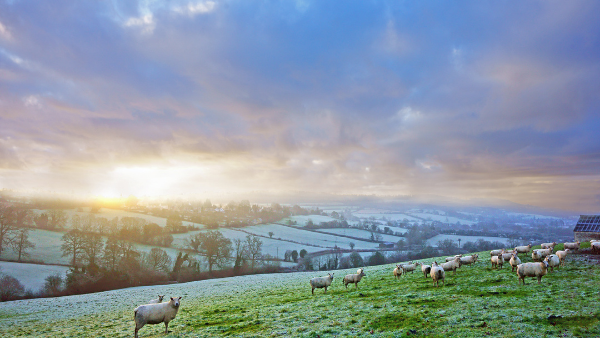Author
DEFRA have published their response to the consultation paper on the Lump Sum Exit Scheme in England. In our previous articles ‘Agriculture Act 2020: Planning a lump sum exit should start now’ and ‘Agriculture Act 2020: Will the Lump Sum Scheme provide an exit’ we examined what DEFRA’s proposals might mean in practice. Now we have the response to the consultation we look in more detail at what will be brought into force.
Timing
The window for applications for the Lump Sum Exit Scheme will open in April 2022 and close on 30 September 2022. When the application is submitted there needs to be a clear plan on how the applicant has exited, or will exit, the industry. The applicant needs to be able to show have they have transferred (or will transfer) the land they farmed on 17 May 2021. The transfer could have taken place before April 2022. It can take place at any time until 31 May 2024. The response document suggests that parts of the land farmed can be transferred at different times.
Transfer of land
To qualify, the applicant can sell or gift land or rent it out on a farm business tenancy for at least 5 years. If it is a tenanted farm, the applicant can surrender the tenancy or (if applicable) a succession occurs.
Surrender Entitlements
The applicant will have to surrender BPS entitlements. It appears that the entitlements will be cancelled when the lump sum is paid.
Partnerships & companies
In the case of partnerships or limited companies DEFRA recognise that a more flexible approach is needed than originally proposed. However, it may still be the case that the scheme doesn’t go far enough to make it attractive. Where partners with at least a fifty percent interest in a partnership or shareholders of fifty percent or more of the shares in a company leave the business, then the scheme will be available. No transfer of land is required in these circumstances and the remaining partners or the company can continue to farm. This would appear to be the case even if the land that the partnership farms is owned by one of the retiring partners and if the retirement leaves only one partner remaining. However, resolving these sorts of practical issues will be more straightforward when we have greater detail. Evidence of the retirement would likely take the form of a Deed of Retirement from the partnership or a share transfer agreement for the company.
The restrictions on entering certain land management schemes (set out below) will not apply to the partners or shareholders who continue to farm, however all of the BPS entitlements for the partnership or limited company would be cancelled, leaving it unable to claim delinked payments.
Non agricultural land
An applicant will be allowed to keep their residential property or commercial property, non-agricultural land and up to five acres of agricultural land. That will assist many owner-occupiers, but it might be difficult to achieve where the land is tenanted. Applicants will also have to transfer any grazing rights they hold on common land by selling, leasing for five years or transferring by gift.
Woodland Schemes
There will now be an option to enter some or all of the land that the applicant held on 17 May 2021 into certain woodland schemes instead of having to transfer it. This was not in the original proposal but has emerged out of the consultation. No further details are given at this stage.
Schemes
Recipients of the lump sum will be required to repay it if they wish to enter into certain new land management agreements (or add land to existing agreements) such as countryside stewardship or the sustainable farming incentive during the transition period. However, as above, that will not apply to qualifying partnerships or limited companies.
Timing of payment
The lump sum will be paid once the applicant has provided evidence that they have met the eligibility rules, including having transferred their agricultural land and rights of common or planted the land with trees under woodland creation schemes. Given that applicants have until 2024 to complete the transfer, it may be some time before the lump sum is paid. As a consequence, farmers will be able to apply for BPS in parallel with the Lump Sum Exit Scheme if they are not due to complete their exit from farming for some time.
The lump sum will be calculated on the average of the BPS 2019 – 2021 scheme years, rather than anything more recent. Although the guidance on the impact of business restructurings during those reference years is yet to be published, it alleviates concerns that any current restructuring arrangements might impact on the sums available in a reference period.
There will be a cap of £42,500 to the reference amount before multiplying it by 2.35 to give the value of the lump sum. This means that there will be an overall cap of £100,000.
If the applicant applies for BPS 2022 or 2023 in parallel with the Lump Sum Exit Scheme, the value of the BPS payments made will be deducted from the lump sum due.
Taxation
The government intends to introduce legislation to provide clarity that the lump sum will be treated as capital in nature and be subject to capital gains tax or corporation tax. The existing capital gains tax reliefs will be available where the qualifying criteria are met. The capital treatment will also apply to interim direct payments which will be deducted from the lump sum payment once the scheme rules have been met. However, if ultimately the schemes rules are not met then they will be treated as income.
It is not only the tax treatment of the lump sum which will need to be considered, arguably more of an issue will be the potential for inheritance tax to become payable if a retirement is not carefully planned. This is a particular danger if the residential element of the holding remains with the applicant and is no longer used as part of a farming business.
Conclusions
There are probably very few farmers who have already sold or transferred land and are now in a position to benefit from the scheme. The likelihood is that they no longer hold entitlements. By contrast, there are no doubt businesses who are contemplating changes and they now have an opportunity to assess the options, with a two year period to implement them. Although the lump sum payment, by itself, is not likely to generate a nest egg for a secure retirement, where a transition was already contemplated to take place over the next few years, the ability to come within the lump sum scheme could be considered.
For further information regarding this article, please contact Vivienne Williams.

